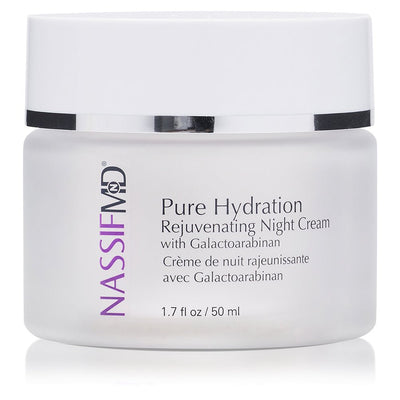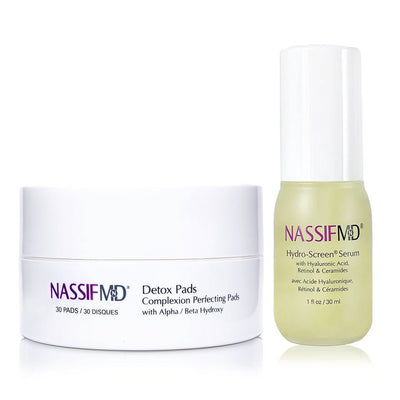SPF Essentials for Healthy, Youthful Skin
The skincare secret for healthy, younger skin is sunscreen! However, lathering up with SPF is often not a priority until we start to see aging signs, like wrinkles and dark spots, show up on the face.
Aging is inevitable, but sun damage isn’t. Sun damage increases and accelerates skin aging. Sunscreen is the best tool for prevention.
If you’re thinking about how to get clear skin or how to get smooth skin, don’t underestimate a good skincare routine with daily SPF. Even with the knowledge about the importance of sunscreen use, many questions arise.
Today’s article will walk you through what you need to know about sunscreen, what SPF is best, and how to get glowing skin with the best SPF products from NassifMD® facial plastic surgeon skincare.
What SPF is Best for Preventing Wrinkles?
SPF stands for sun protection factor, a measurement of how long it would take for the sun’s UV rays to burn the skin compared to no sun protection. For example, SPF 30 means you can last 30 times longer in the sun without burning.
Chronic sun exposure decreases the skin’s collagen levels, thickness, and elasticity, contributing to wrinkles. Sunscreens help to prevent sun damage and wrinkles.
When choosing a sunscreen for wrinkle prevention and other skin health benefits, select a broad-spectrum product that protects against UVA and UVB rays and SPF 30 or higher. Additionally, use the product as directed; most people don’t apply enough sunscreen to achieve the full benefits of this skincare step.
What is the Minimum SPF for Anti-Aging?
Most dermatologists and professional organizations, including the Skin Cancer Foundation, recommend a minimum SPF of 30 for skin health and anti-aging benefits. Choose a mineral sunscreen (vs. chemical options) that reflects the sun’s rays and use it as the final step in your morning skincare routine. (Link to how to layer skincare article from July 2024 week 1)
Does Sunscreen Help with Anti-Aging?
Research suggests that regular sunscreen use not only prevents sun damage but may “visibly reverse the signs of existing photodamage.”
In this study, 32 participants applied a broad-spectrum face lotion with SPF 30 to their faces daily for one year. Compared with baseline assessments of skin aging, results were observed as early as 12 weeks into the study. By the one-year mark, 100% of participants showed an improvement in skin complexion (clarity and texture), with a range of 40 to 52% improvement from baseline.
Is SPF 30 or 50 Better?
So, if SPF 30 produces such great results, wouldn’t SPF 50 be better? To put it in perspective, SPF 30 (when properly used) blocks 97% of the sun’s rays. SPF 50 blocks 98%. For many people, that 1% might not matter much, and both sunscreens will provide similar benefits by blocking the vast majority of rays.
However, for people who are fair-skinned or burn quickly, a higher SPF might be warranted. Additionally, those who don’t apply enough sunscreen or reapply as indicated might want a more concentrated product.
The typical recommendation is to apply sunscreen 30 minutes before going outside and reapply every 2 hours or after swimming.
Does SPF 50 Clog Pores?
Some people shy away from sunscreen as part of their skin beauty routine because of the fear of clogged pores. The truth is that not all SPF lotion is created equal. While some products could contribute to clogged pores or not be a good fit for your skin type, good skin products can enhance the skin’s appearance.
The question of how your skin will react to sunscreen is one reason to choose quality products that contain science-backed and safe ingredients. NassifMD® Skincare products are formulated with noncomedogenic ingredients, meaning they won’t clog pores.
Is SPF 70 Too Much?
We saw that SPF 50 blocks 98% of UV rays, and in comparison, SPF 70 blocks 98.6%. SPF 70 products may be thicker and more expensive while only providing minimally more benefit.
One study went beyond SPF 70 to look at SPF 100. The study followed 55 healthy people over five days at the beach. The participants used SPF 50 on half of their bodies and SPF 100 on the other half. Both the participants and the researchers know which was which. The study found that SPF 100 worked better than SPF 50 for preventing sunburn. A significant limitation of the study is that participants were recruited from the beach instead of random sampling.
One argument against very high SPF lotion, like SPF 70 or 100, is that the numbers can give a false sense of security. People who choose these may think they have more protection than they do and not follow a proper skincare routine with reapplication every 2 hours when outside.
What SPF is Best for the Face?
Healthy sunscreen use is critical when it comes to the desire for perfect skin and choosing glowing skin products. The NassifMD® SPF Skincare line offers the highest quality SPF face lotions to enhance your daily skincare routine.
NassifMD® Protect & Hydrate is a tinted formula that can help streamline your skin beauty routine. This natural skincare product combines the best face lotion with SPF 44 with hydrating ingredients, including hyaluronic acid and antioxidants, including vitamin C. The SPF protection comes from minerals (zinc oxide and titanium dioxide) making it one of the healthiest sunscreens for your skin and health.
NassifMD® Simply Hydration is our un-tinted formula that you can use in several ways:
- Face lotion with SPF
- Daily body lotion with SPF
- Hand lotion with SPF
The formula offers SPF 40 protection from minerals, moisturizing ingredients, and powerful antioxidants. It’s truly the best daily lotion with SPF!
Don’t forget your lips! For as much attention we give the face, we often overlook protecting the delicate skin of the lips. NassifMD® SPF15 Hydrating Lip Balm is protective, hydrating, and nourishing. Carry it with you and apply as often as you like.
The Benefits of Daily SPF Use
Daily sunscreen helps prevent aging due to sun damage and skin cancer while promoting long-term skin health. The best time to start a consistent sunscreen routine with natural skincare products like NassifMD® Skincare is today, no matter your age or sun habits.
Anti-Aging
About 80% of skin aging can be attributed to sun exposure. Therefore, the anti-aging benefits of SPF sunscreen are far-reaching, and we cannot overstate them.
Sun exposure can lead to:
- A thinning of the dermis (the second layer of skin)
- Hyperpigmentation
- Declining skin elasticity
- Abnormal cells and cancer
Consistent sunscreen use helps prevent these skin changes and promote beautiful skin. Even if you follow a simple skincare routine, SPF is essential for anti-aging.
Long-Term Skin Health
As a culture, we often want quick fixes to our skin problems, and these strategies have their benefits and place. However, nothing beats prevention.
Prevention isn’t always exciting or sexy; it has more to do with daily (often boring) health habits like eating well, exercising, and applying sunscreen. Building healthy habits will benefit your body (and skin) over time. Your older self will undoubtedly be happy if you’re wearing sunscreen today!
Skin Cancer Prevention
It’s well-known that sun damage to the skin can lead to cellular changes that may promote cancer formation. Sunscreen can help mitigate this risk by protecting cells from sun damage in the first place. But not all sunscreens are created equal. Some chemical sunscreens raise concerns about human health and the environment, whereas mineral sunscreens are safer.
By combining the best of SPF science with quality skincare, offering a synergy of active ingredients, NassifMD® SPF Skincare promotes hydration, radiance, and overall skin health. Try it for yourself today and see the difference!
References
- Guan, L. L., Lim, H. W., & Mohammad, T. F. (2021). Sunscreens and Photoaging: A Review of Current Literature.American journal of clinical dermatology, 22(6), 819–828.
- Petersen, B., & Wulf, H. C. (2014). Application of sunscreen--theory and reality.Photodermatology, photoimmunology & photomedicine, 30(2-3), 96–101.
- Randhawa, M., Wang, S., Leyden, J. J., Cula, G. O., Pagnoni, A., & Southall, M. D. (2016). Daily Use of a Facial Broad-Spectrum Sunscreen Over One-Year Significantly Improves Clinical Evaluation of Photoaging.Dermatologic surgery: official publication for American Society for Dermatologic Surgery [et al.], 42(12), 1354–1361.
- Kohli, I., Nicholson, C. L., Williams, J. D., Lyons, A. B., Seo, I., Maitra, P., Tian, X., Atillasoy, E., Lim, H. W., & Hamzavi, I. H. (2020). Greater efficacy of SPF 100+ sunscreen compared with SPF 50+ in sunburn prevention during 5 consecutive days of sunlight exposure: A randomized, double-blind clinical trial.Journal of the American Academy of Dermatology, 82(4), 869–877.
- Sander, M., Sander, M., Burbidge, T., & Beecker, J. (2020). The efficacy and safety of sunscreen use for the prevention of skin cancer.CMAJ: Canadian Medical Association journal = journal de l'Association medicale canadienne, 192(50), E1802–E1808.






















